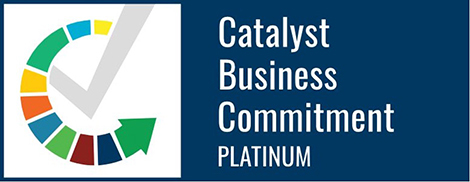
Sustainable sourcing
We aim to work with suppliers who share our values, and we expect high standards of business conduct from those who represent us or do business with us.
Our approach
Due to the nature of our business, we are predominantly a consumer of services, and not products or raw materials. Compared with other industry sectors such as manufacturing, the risks associated with the environmental, social and governance impact of Zurich's supply chain are low. Nonetheless, we are committed to effectively managing such issues within our supply chain.
We aim to work with suppliers who share our values, and we expect high standards of business conduct from those who represent us or do business with us. We are continually working to improve processes and guidelines for managing sustainability issues in the supply chain and have established a Sustainable Sourcing program in order to establish the necessary governance and allocate the required resources to our efforts. Our Sustainable Sourcing program has three core pillars that address environmental, social and ethical factors. The key objective of the program is to embed these factors throughout the sourcing lifecycle.

Supplier Code of Conduct
For some time, we have been considering environmental, social and ethical factors using evaluation criteria to assess the goods and services we buy. We have also been ensuring that relevant sustainability clauses are included in contracts with suppliers, such as ethical conduct and labor, health and safety and environmental standards.
With the launch of our Supplier Code of Conduct in June 2021, we set out clear environmental, social and ethical expectations for our suppliers, globally.
Our expectations are based upon practices that we have already adopted within our own operations. By establishing the Supplier Code of Conduct we aim to use our influence as a significant buyer of goods and services, as a force for good, accelerating the global adoption of sustainable business practices amongst our suppliers.
We are engaging with our suppliers to align on the Supplier Code of Conduct expectations. This starts with us sharing our training videos and asking them to complete a self-assessment to rate their performance.
We work with our suppliers to address any areas where they don’t meet expectations and aim to agree contractual clauses to embed the standards - ensuring an ongoing focus on sustainability for the benefit of Zurich, our customers and society as a whole. We take our sustainability commitment seriously now and for the future, so where engagement fails, and suppliers can’t or refuse to embed the minimum standards, we’ll review the relationship and consider phasing them out to protect our commitment to doing the right thing.
As of the end of 2024, we confirmed that 72.9%1 of our managed procurement spend is with suppliers that meet or exceed the key expectations of our Supplier Code of Conduct, pursuant to their self-assessment.
"We aim to use our influence as a global buyer of goods and services to drive the adoption of sustainable business practices amongst our suppliers, because as a company, we acknowledge that working with others is where we can make the biggest impact"
Spotlight on Environmental
In June 2019, as the first insurance company, Zurich committed to set targets in the framework of the UN Global Compact Business Ambition Pledge that aims at limiting global temperature rise to 1.5°C above pre-industrial levels.
Since then, Zurich has set science based targets to reduce emissions and is targeting net-zero operational emissions by 2030.
We believe that our suppliers should also commit to reducing the environmental impact arising from their operations so we're proud to have been recognized by CDP as a leader for our work engaging with our suppliers to tackle climate change for the third year running.
Net-zero supply chain
We are looking to our supply chain to set emissions reduction and net zero targets. Our goal is for 75% of our managed procurement spend2 to be with suppliers that have science-based3 emissions reduction targets by 2025 and net zero4 targets by 2030. We aim to use our influence and press for change, expecting suppliers to set their own targets.
As at the end of 2024, 59.4%3 of our managed procurement spend1 was with suppliers that have science-based emissions reduction targets and 51.9%4 with suppliers that have net zero targets.
Helping suppliers reach net-zero
Zurich has teamed up with the SME Climate Hub to offer SME suppliers free access to tools that help estimate their carbon footprint, find ways to reduce emissions, and commit to a net-zero future via the SME Climate Commitment. This initiative supports Zurich’s ambition to become a net-zero emissions business and encourages climate action throughout our supply chain.
Spotlight on Social

At Zurich, we are committed to supporting a fairer, more open and sustainable society and aim to generate positive social impact within the communities that we operate. We expect our suppliers to contribute to society in a positive way by respecting human rights and treating people fairly. We also seek out opportunities to engage with social enterprises and recognize the key role that these businesses play in creating social value. We are proud that our work with the social enterprise sector has earned us the highest recognition, platinum status, from the Catalyst Business Commitment (CBC). You can learn more about our approach by watching our social procurement video.
Spotlight on Ethical
At Zurich, we care about doing the right thing and embrace high standards of business conduct. We endeavour to work with suppliers who share our values, and we expect high standards of ethical conduct from those who represent us or do business with us.
We have established a framework of minimum standards to be applied to the onboarding and management of third parties with which we work, including suppliers. The framework adopts a risk-based approach to establish onboarding and management measures, such as third-party due diligence processes, that are relevant and proportionate to the nature and risk of any particular transaction. We consider supplier alignment with our Supplier Code of Conduct as part of our due diligence processes and request selected suppliers to complete a self-assessment covering our ethical expectations including those relating to protecting people’s personal data, retaining records and whistleblowing.
We have a referral process in place to investigate or resolve, as appropriate, any red flags identified during the due diligence process. We also use a software tool that uses artificial intelligence to screen news reports, social media posts and NGO reports to monitor potential ESG-related supply chain issues. We additionally seek to include specific provisions within our supplier contracts requiring suppliers to embrace ethical business practices. From time to time, we may conduct audits or follow-up reviews on these topics with our suppliers.
1 The spend of approximately USD 2 billion annually managed by Zurich’s Procurement and Vendor Management function according to the 2023 baseline on goods and services that are required to enable Zurich to maintain and develop its operations, excluding suppliers no longer active in the year of reporting.
2 The spend of approximately USD 2 billion annually managed by Zurich’s Procurement and Vendor Management function on goods and services that are required to enable Zurich to maintain and develop its operations.
3 We consider a supplier to have science-based targets when their emission reduction targets are approved by the SBTi, a similar scientifically accredited body or otherwise require a reduction of at least 42 percent in scope 1 and 2 emissions.
4 We consider a supplier to have net-zero targets when their net-zero target is approved by the SBTi, a similar scientifically accredited body or otherwise has a public target to neutralize any residual scope 1 and 2 emissions.
5 Pursuant to the Swiss Ordinance on Due Diligence and Transparency in relation to Minerals and Metals from Conflict-Affected Areas and Child Labor.


